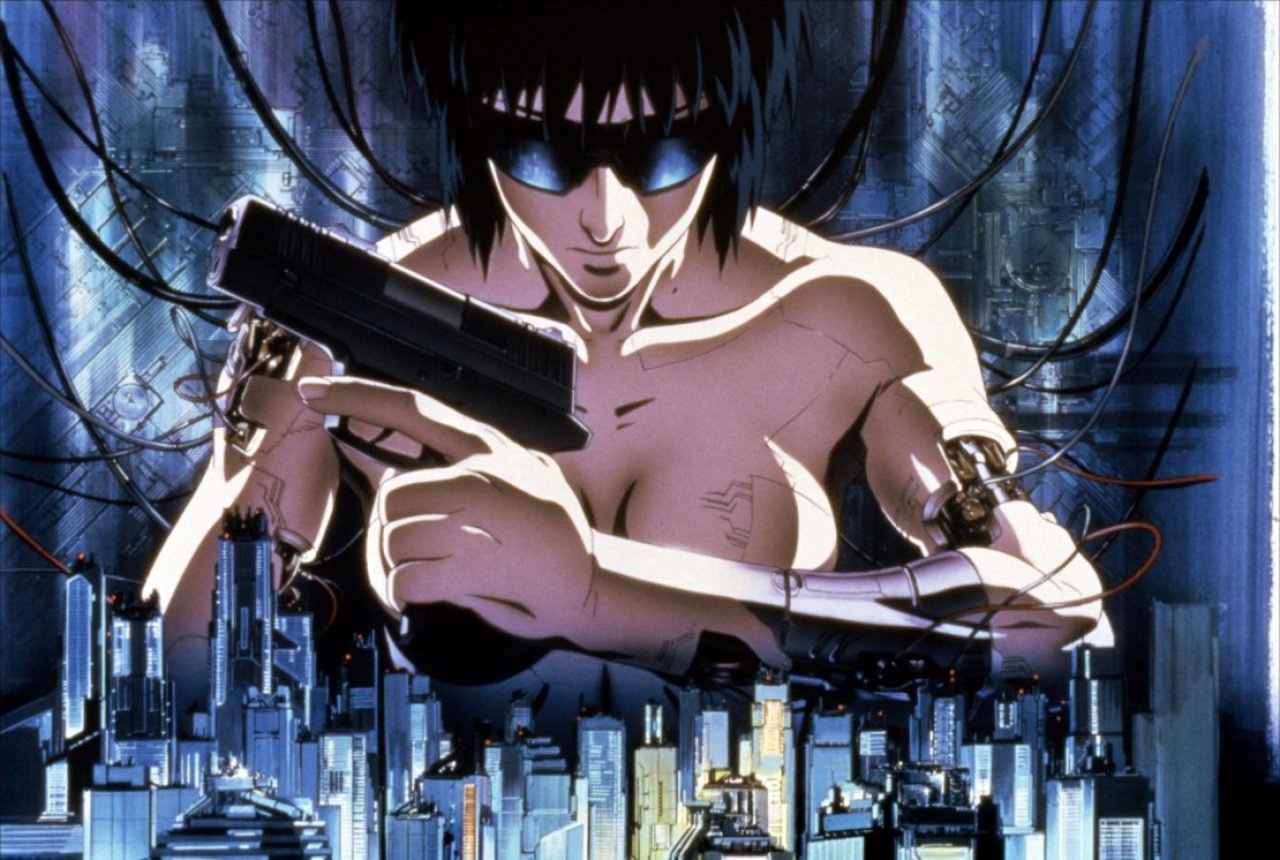It’s all nice being a magical girl and all, but I kinda feel that this isn’t for me, after all I feel kinda cold all the time and has difficulty in expressing emotions and even wondering if I am even real, oddly I got like that after I got a voucher to try out some new government project beaut salon coupon, where they give you superhuman powers and feel as you were as hard like steel.
This is in New Port City and there are rumors about that there are some kind of virus that infects people who has gone gotten the make over, so I do kinda regret taking that voucher.
Apparently the virus is affecting the Ghost in the Shell?
Directed by Mamoru Oshii (押井守) and based on the original work of Masamune Shirou (士郎正宗).
It’s set in a distant futuristic (cyberpunk like) alternative Japan, where we get to follow:
Motoko Kusanagi (草薙素子)
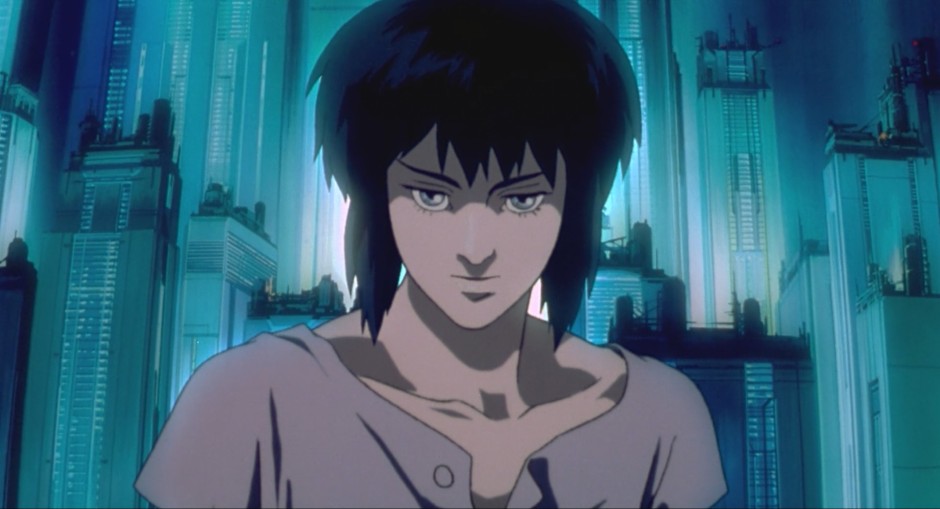
She is a special operative officer in Public Security Section 9, who is currently on a case where an unknown hacker is spreading a virus that causes people to change their perspective of reality and similar hacker shenanigans.
She is a heavily modified cyborg, although only her body, in essence it means she does not know her “ghost” or soul, thus she has little to no humanity left in her (this is vaguely defined, due to the fact that a cyborg in the movie is vaguely defined).
Thanks to these modifications she’s

Err.. I mean, besides her having a splendid cyborg body:

She’s capable of turning invisible on multiple levels (thermal and to our visible eye), granted she has to be naked.
As expected from someone whom does not express her emotions often, she isn’t a very social person, in fact she is very much alike to an ‘ideal’ military robot, who obeys commands and nothing more or less, in fact she questions the mere existence of herself, doubting whenever or not she’s actually human and not synthesized.
But like in every special operative movie, you need a partner and for Motoko it’s:
Batou ( バトー)
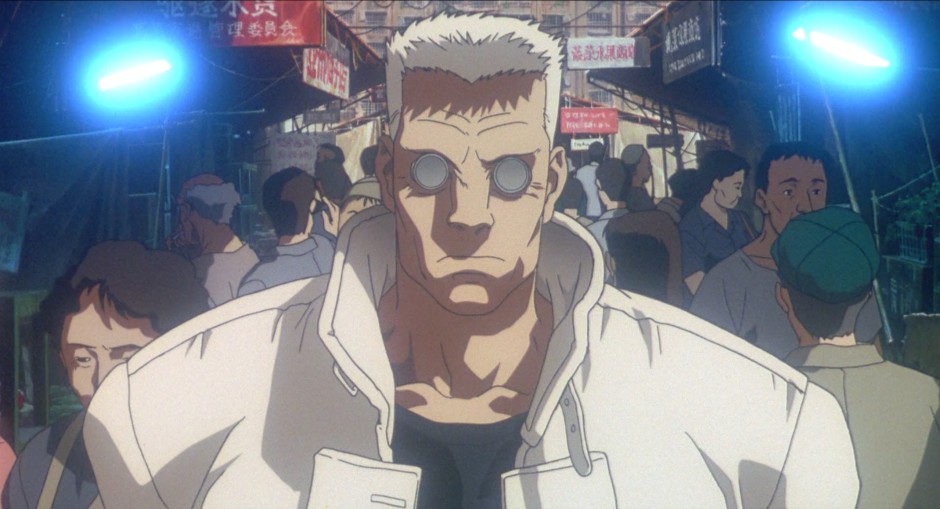
His vision is binocular.
And of course she got a boss that yaps at her:
Daisuke Aramaki(荒巻大輔)
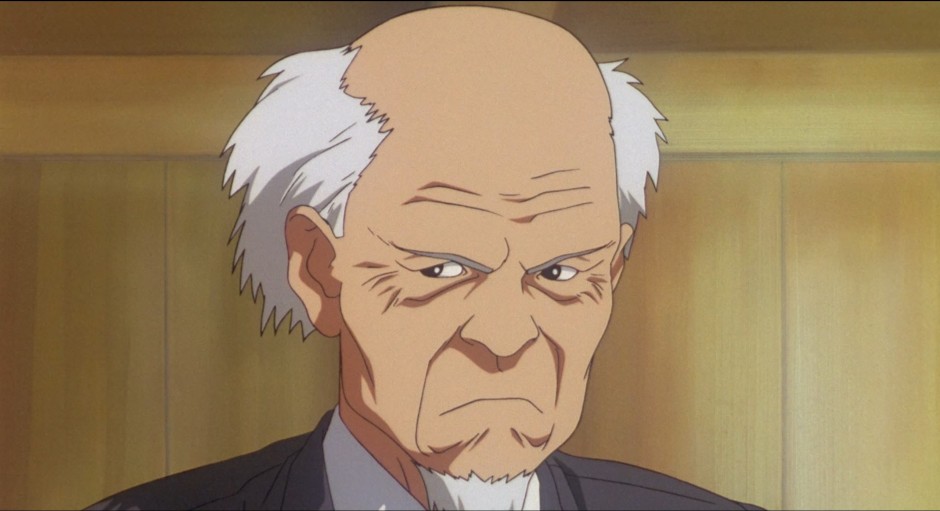
They all work for Public Security Section 9, which is a organization that is recognized internationally as an intelligence, search and rescue organization.
However that’s just a shell to be granted certain international privileges, nationally it’s a counter-terrorist and anti-crime division in the National Public Safety Commission, in essence it means it’s Japan’s equivalent to a spy agency with Special Operations training and methods to accomplish their mission.
For example, due to the importance of capturing this hacker, Section 9 methods may include murdering fellow diplomats whom are trying to extract key people involved with the hacker:

So who just is this hacker?
Well, that’s a bit hard to explain given that the hacker’s nickname is:
Puppet Master (人形使い)
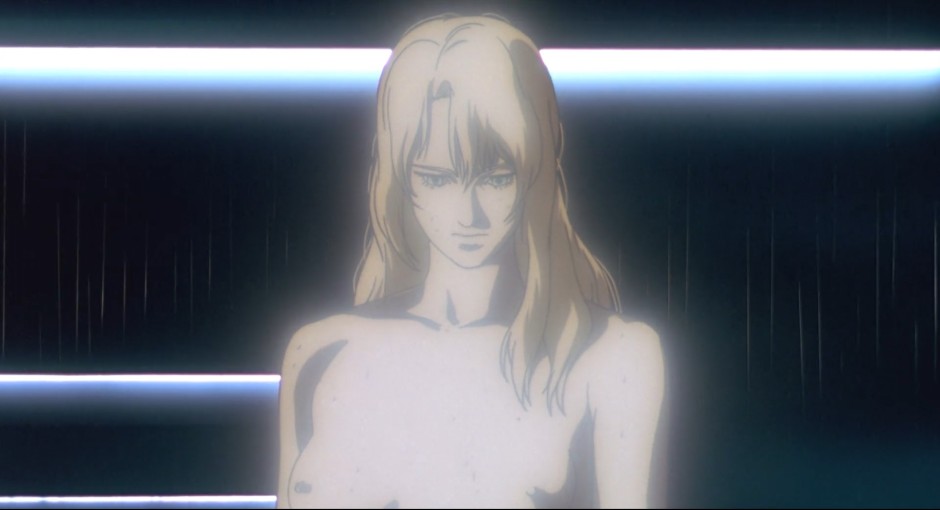
Not just obscene to the law, but to the public too!
Technically, that is the Puppet Master, but since it’s virus is made to at the very least mess deeply with someone’s state of consciousness it is technically inside a vast number of bodies.
Who suddenly is captured and taken in for analysis as to how a complete cyborg could be assembled by itself at the same corporate factory that makes the cyborg modules for Section 9.
And that’s Ghost in the Shell, although it is over 20 years old, it sure still holds up.
Granted it is only 20 years old and it is famous for still holding up, but I still hold true to the fact that it is underappreciated just how seamless and smooth the animation is.
The visuals are just fantastic and while it does use CGI in certain scenes, the fact that they manage to manipulate fine detail and precision to the point where you would almost think it had the budget of a Disney movie, it is something I wish more anime studios would strive for, due to it’s very mixed use of color shading.
Of course this color shading is mostly thanks due to Ghost in the Shell being mainly hand drawn and it is a price you have to pay for when you use CG, the evidence of this is most obvious whenever they show anything ‘digital’ being accessed, where it’s main just a mess and very simple layered graphics, granted it’s also one of those few times where it’s actually a valid excuse to use CG to animate such interfaces being shown, since it won’t really matter what you use when dealing with electronic displays.
And you can’t forget the atmosphere, it is in my opinion the anime that sets the tone for future work in cyberpunk, much of it is due to it’s very detailed and realistic approach to how a cyberpunk world would look like, this coupled with the fact that the characters while may not look ‘good’ as in they might look a bit awkward, the details they have is far beyond what most other anime manage to have.

To binge-watch more moe anime or to become a moe character, that is the question…
The music is to say the least unique, well the little there is, most notably the opening theme song, but from that, I think it certainly capture a very interesting forced mix between the future and the past (much like how certain old genres that were almost dead, has slowly begun growing and being used in mostly work that would be deemed futuristic by the height if said genre).
However, when it comes to the story, I have to say it is where Ghost in the Shell falls short, in fact it’s a bit overrated, here’s why.
While the premise of the movie does indeed have a story, it isn’t however built up from being conventional, in that the story is grounded around a goal or exploring certain issues which in turn leads to larger exploration into certain fields.
No, Ghost in the shell is very much more focused on basing a story around philosophy, in that of “The Concept of Mind” and to a degree “Do androids dream of Electric sheep?”, where it speaks greatly about consciousness in that of dualism.
Now there is no real issue about that, since that’s a matter of taste, however to problem with it in Ghost in the Shell is that it’s structured very loosely, which is a very, very common problem with any media that is trying to base something mostly on philosophy, it turns into a ‘deep medium’ cliché.
This is mostly due to how limited and minor the world is defined and explained, it’s essentially like learning calculus before learning what equation is in math, that kind of approach usually leads to lots of time wasted trying to figure out a puzzle that was never there to begin with if you were to follow the most sensible path and from there develop it.
In Ghost in the shell what is missing is the definition and explanation of: what is a cyborg? What is a ghost? What is Project 2501 (Puppet Master) goal? What is the power structure of Japan? What role does Section 9 have with everything involved?
Et cetera, it does not need a fully detailed explanation, instead only what is required to understand the situation to the degree where we can start to puzzle things together, since only then can you explore a much more complex and broad subject such as different philosophies.
So from a story perspective it’s just about a special operation agency trying to catch a hacker where the government of Japan is trying to use the hacker’s AI to infiltrate other countries for various reasons.
And this as I said is passable, even if we barely get to see it and it is halted and ended after half way through the movie.
I think most of all it is the screen time of only 2 hours that makes it hard to express a very thought out story and leaving out enough room for you to explore it’s philosophy.
The characters themselves are pretty good, based upon what their role is, Motoko is a very doubting yet calm person where as Batou is only doubtful to other people’s skepticism and actions lacking an established rationality (like for example when Motoko dives in the deep water even thought knowing any point of her equipment failing would mean an almost unavoidable death).
Of course the person who steals the show is the Puppet Master, while barely being directly shown and there being very little information about this person, it is still the most mysterious yet complex character of them all, mostly due to it’s “ability” to string pieces together in it’s favor.
Granted there is some issues I have with Ghost in the Shell, one of them being it’s minor but still present Japanese “superiority”, it’s very much of a cliché within anime and manga to have either the country or characters be strongly representing Japan in a very exceeding manner, where as it isn’t belittling other countries (at least to a bare minimum) but instead making Japan or the Japanese character(s) greater than what they actually are in the eyes of others.
This is very different from just criticizing it for not being realistic, of course you could create a fantasy world where anything is possible even within your own country or other country (although you would need to do some research on that front), however there’s a fine line to be crossed between simply it being based in said country and almost drooling over it, take Monster for example where the main character is Japanese and is constantly portrayed almost as a saint, again nothing inherently wrong with that, only when you make it the story of said character or country only head towards an one dimensional conclusion: he/country is great/powerful.
As I said this isn’t a big deal in Ghost in the Shell, since at least to the official story Section 9 is more or less attacked BY the Japanese government for intervening with their plans to take advantage of Project 2501.
And if anything this is just something that is very much ingrained in many different countries, a biased view of your own country.
Another common occurrence in anime and manga is the firm reliance of the current establishment and values which is a key difference to western idea of individualism where the truth from the people is more important than the establishment, in particular in this movie’s case, it is how there is no question about Section 9’s own established structure and very minor critic of the Japanese government (in that they want to exploit Project 2501 to their advantage), but aside from that, it never falls into something where Motoko is a lone woman having to fight the entire system to bring out the truth to the people, in fact the people never get to even know about this whole incident.
Which is more or less rather clumsy in many cases, especially in sci-fi media, where the whole point is usually to either:
- Trying to see what happens when you contain a society through certain philosophies or ideologies.
- Exploring new ways of how the human race would evolve with the help of technology.
Lastly it is a bit sad it does not take more inspiration from the manga than the characters and main premise of the philosophy/story, would’ve been interested to see Motoko and Batou relationship with humans (which is a light hinted with Batou caring for Motoko more than just partners), which is more or less explored in the manga.
So with that being said, Ghost in the Shell is riddled with intentional or unintentional philosophies and messages.
While it is mostly summed up in that it is trying to explore the possibility of fully augmented (or nearly fully augmented cyborgs) cyborgs having a human consciousness and just in general what it means to be human, where the difference may lie in a machine made out of flesh and a machine made out of flesh and bones.
One prime example of this is how the cyborgs have no reaction to being naked (granted as I’ve said in the past, this also is mostly due to the Japanese putting way less emphasis on the dogma of being naked is immoral), thus at least hinting towards them not having an arbitrary consciousness but instead a prefix, a codec where said cyborg will react according to protocol and nakedness is regarded with least concern.
And this is why I believe the Puppet Master and Motoko is drawn to each other, Motoko is unsure about her own existence, as if she can sense her own limits of being a cyborg, while she uses a pretty flawed argument in that she hasn’t seen her brain, thus she can’t know if she’s even remotely human or not.
On the other hand, the Puppet Master is a being created out of a program, it lacks any interaction with a being capable of hosting this vast complexity and also surpass the limitation set by the programmers and also having a way of being able to fend of against foreign entities trying to destroy the sentiment part of the AI (such as viruses) due to the Puppet Master only being capable of creating clones or manipulating existing cyborgs.
Lastly I stumble upon this blog post:
Which I thought was an interesting read, although riddled with biased political viewpoints.
Where they starts of by explaining what Google will autocomplete when you type in Motoko.
Their evidence being that Google autocomplete search results ended with:
- “a man”
- “is hot”
- “in bed with a boy”
- “in bed.”
To be honest I don’t even what to say here other than saying, so?
Those results seems pretty mild and innocent to be honest, unless you yourself insert Motoko usual stealth operation ‘suit’ or lack of suit.
In fact I when I tried to replicate their evidence, here’s the result in 2016:
And I’m not trying to use this as some form of counter-argument against their evidence, I am however stating that using Google search as evidence for the claim that Motoko is sexualized won’t you do much good due to the sheer diversity of people searching for different things, thus causing the most popular search result to change.
And I would agree with their statement that her posture isn’t sexualized.
So later on in the post they describe how Motoko does not go through a morning routine that we humans has to go through (breakfast, wash their face, make sure they look pretty), I would argue I’ve seen characters at most do two out of three of those in anime/manga, but still I do agree it is a sign that she is indeed more cyborg than human.
Which begs the question, why can’t her nakedness be part of that?
It’s why I like Ghost in the Shell, to many it will be a “in your face” due to their culture telling them the dogma of nakedness being a sign of immorality or lack of modest, but in this movie, anyone wishing to be a special operative specializing in reconnaissance or other similar tasks without being detected.
Because the argument about Batou being chivalrous does hold some truth to it, but I would argue it could either be because of an old comedy cliché anime/manga uses to break a formal agreement within Japanese society (in that they are hyper reactive to anything) or that he simply pity Motoko for having either having to expose herself for the sake of keeping Japan safe or in that he can see she is “less” human because of her lack of consciousness regarding her exposing herself.
Heck maybe he had some traumatic experience as a child, we simply do not know his reason for trying to avoid seeing her naked.
But I would wager it is due to him having feelings about her and thus having a form of pity of her, since he does not cover up the Puppet Master once Motoko is hooked up with Puppet Master.
Another correction is that she will not physically bear Puppet Master‘s children, instead via the network (don’t know how that work, but we will have to see later).
After this there’s some talk about how detailed the breast of the Puppet Master’s body is, as compared to their face, which to me felt rather silly, in the same shoot I have of the Puppet Master you can barely make out it’s nipples and in fact the same applies to Motoko when she’s trying to open up the tank seal:
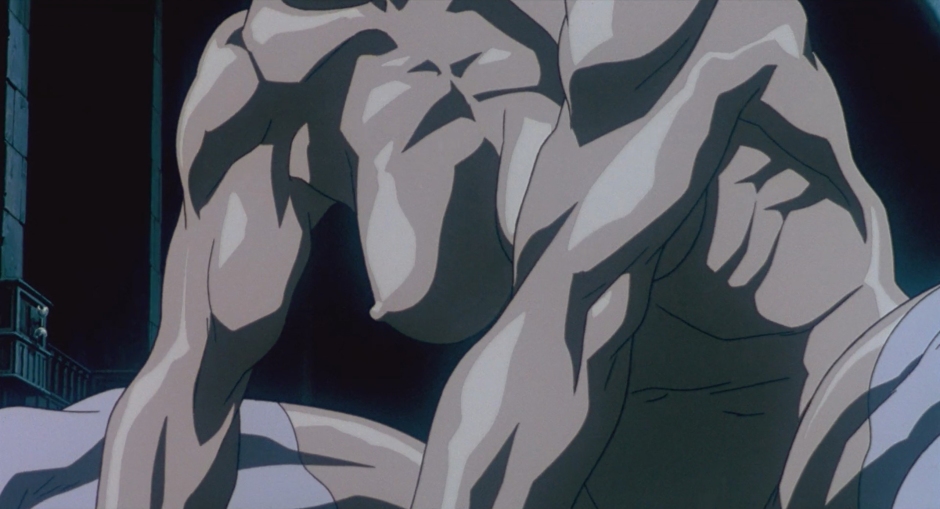
And then when Batou saves her and checks on the Puppet Master‘s body:
Although it might be hard to see on the Puppet Master’s body, it’s still very detailed and yes this includes the nipple compared to the picture above with Motoko.
So to answer their question, no and yes, it is important to show her lack of consciousness over her own body and no because Japanese culture does not put much emphasis on nudity in very area of society.
And no, given the lack of screen time for any of the characters beside Batou and Motoko, there are various clothed females in the movie, although some disappearing faster than others.
But still I agree with their conclusion of the real intent that it is more due to the creator’s attention to detail it can come off as sexualized (not really) to those whom chooses to see sexualization as a real thing and whenever or not their intent to neutralize the woman body is true or not I would say is very subjected based on their culture it would fit more neatly in to it being part of the culture and thus only be neutralizing and shocking to other culture where nudity is seen as immorality.
Of course whenever not Everyone, especially teenagers will understand this is beyond doubtful, this video is subjective, not objective about it’s message, it’s why you can assume the movie speaks to you directly (which seems to be the case).
So it isn’t sexist regardless of how it’s portrayed, and if the viewer is so, it’s the viewer, you can’t do anything about your follower having various opinion on your work, since later on their work starts to diverge into some form of self-reflection/interpretation into some twitter hashtag that is beyond me why you would judge everyone the same or assume that everyone does so to you.
In the end this wasn’t meant to be some serious debunking of said blogger’s post, I think their objective conclusion is very much in line with what the creator wanted to accomplish, but while they have every right to have a subjective view of the movie, in this case that it influenced them (to even get a similar haircut to Motoko, which is really cool) to the point it speaks to you, you would be entirely correct to do so, although I do hope they also understand that does not mean others will disagree with them about this and that they can have a very different opinion of both you and the movie and it’s message, we’re all different to come to understand that just like Motoko or Major learned to accept who she is and who Batou is, so can anyone.

